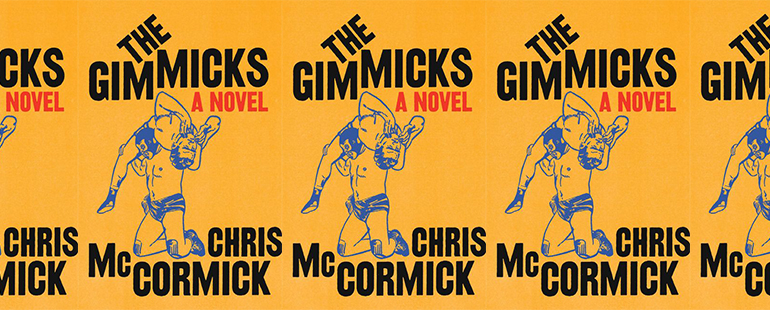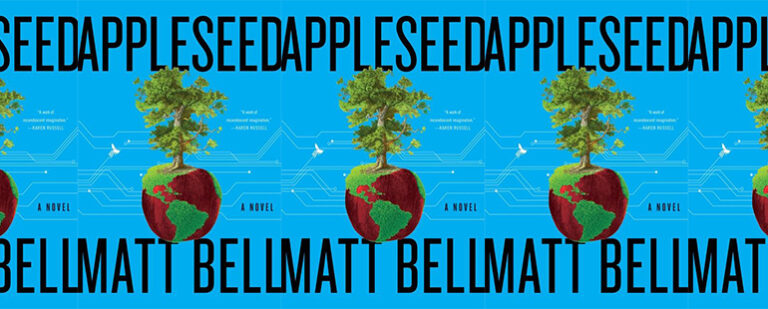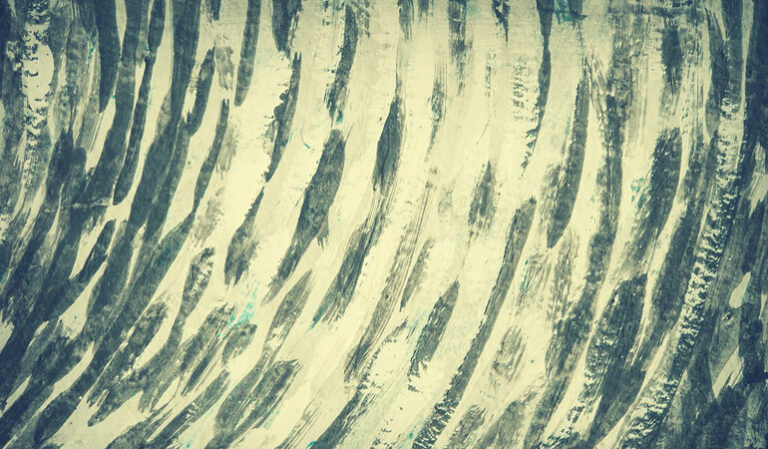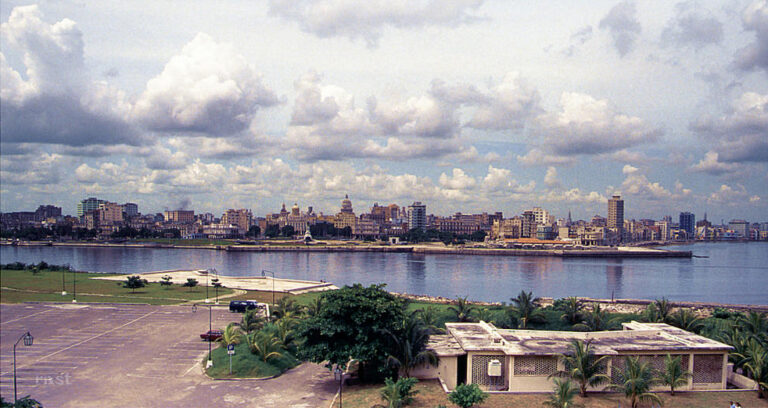“Part of What the Novel is About is the Gimmicks That We Put on as Individuals”: An Interview with Chris McCormick

Chris McCormick’s first novel, The Gimmicks, is a wild storytelling ride through the American west, Soviet Armenia, and our relationship to personal and political truths. It follows pro-wrestling manager and sometime pro-wrestler Terry “Angel Hair” Krill as he tries to find his former protégé, Avo Gregoryan, in the landscape of the American desert. This journey starts when Mina Bagossian, the woman Avo had once promised to marry, asks Krill to search for him; Krill, who has always felt that Avo reminds him of his dead brother, Gil, agrees out of a feeling of indebtedness to Avo. The quest, however, is gradually overtaken by narratives of Avo’s former life in Soviet Armenia and his involvement with the Armenian Secret Army for the Liberation of Armenia (ASALA), a guerilla organization that from 1975 to 1988 sought reparations for the Armenian Genocide by targeting Turkish ambassadors, among others. Admittedly, Avo was brought into ASALA not out of his own interest in revenge, but rather out of his desire to escape Soviet Armenia. He joins at the behest of Ruben Petrosian, a distant cousin whose family took the orphaned Avo in at the age of fifteen; while Avo isn’t an idiot, throughout the novel Ruben is the brains of their dyad.
In allowing himself to be shaped by others in his journey, we see how the truth can be covered over allegedly for our own advantage—and that such cloaking is, in truth, for the advantage of others. While Avo doesn’t always understand Ruben, he believes that the two of them are alone against the world. So, when Ruben tells him when they are seventeen that they have to incapacitate Mina so that the two of them can attend an international backgammon tournament in France to escape Armenia, Avo does so in his own way—with a deadly result. It doesn’t take much from there to convince him to follow Ruben to the United States to work for ASALA. When Mina marries another man because Avo left Armenia without telling her, Ruben doesn’t tell Avo until that knowledge works to Ruben’s advantage; at the same time, he allows Avo to believe another lie to keep him away. Ruben and Avo’s task as members of ASALA—to force Armenian Genocide-denying scholars to acknowledge the event and eliminate those who don’t—similarly involves the humanity of those scholars outside of their studies being kept from them. Only in tailing the scholar he is assigned to kill does Avo see the man as more than just someone spouting rhetoric; this causes him to abandon the mission—he realizes that killing in vengeance is wrong and not the way that Armenians should behave.
What The Gimmicks also grapples with is what it means to be an American and how the American West’s no-man’s land presents a ripe opportunity to shape and reshape one’s identity. This opportunity to shapeshift is apparent in the monikers that Avo and Angel Hair take on as wrestlers after Avo arrives in the US. Avo’s long list of names includes: The Ugliest of God’s Creation, The Unique Unibrow, Harry Knuckles, Harry Krishna, The Shah, The Ra, The Beast from the Middle East, Killer Kabob, King Kong of the Caucasus, and The Brow Beater. Each indicates both the way Avo would like to present himself and an admission of what the audience wants to see. Angel Hair, who was on the pro-wrestling circuit before a career-ending neck injury, also knew that it was possible to reshape oneself, having started his career in the navy, then worked on a fishing boat, then become a pro wrestler before becoming a pro wrestling manager; when we meet him, he is a cat breeder. Relying on no one else, Angel Hair metamorphosizes again and again because he has to. It isn’t until the end of the novel that he realizes that perhaps there is a cost to a life that has only the illusion of constancy—that in the end, everyone longs for something permanent and real. As he thinks about the women pro wrestlers meet on the road, women who the wrestlers believe are there for more than a one-night stand, he remembers that Avo was never taken in by them, that he always had his sight set on one woman.
Though McCormick, author of the award-winning short story collection Desert Boys, is currently based in Minnesota, the half-Armenian writer grew up in California. The “insider-outsider dynamic” of growing up with an Armenian family in a mostly white suburb is central, he says, to his becoming a writer and to his understanding of narrators. His writing is a product of having to constantly grapple with his own feelings of belonging and not belonging to his extended Armenian family and community, a sentiment familiar to Americans with hyphenated identities. This experience cultivates awareness and a lifetime of being observant—the hallmarks of a writer. Such awareness of how identity is constructed is also a part of what it means to be an American—the promise of reshaping the self into something new that allows one to choose what to leave behind.
This deeply personal decision making is embedded in Avo’s narrative and is particularly present in his choices to not kill the denialist professor and to quit ASALA, though the latter decision turns out to be deadly. We can posit, then, that The Gimmicks represents American identity—full of choice and individualism, though not in as positive a manner as we would like to believe.
I recently spoke with McCormick about writing a diaspora novel that doesn’t have an agenda, how he decided to tell this particular story, and “the gimmicks” of the American Dream.
Maria Eliades: To start off, why did you decide to tell this particular story? I found it to be surprising; it really carried me away, which is rare. What came first: knowing that you had to tell it or wanting to tell it?
Chris McCormick: I grew up with an Armenian mother who immigrated [to the United States] in 1975 at the age of nineteen, so I always knew that I would write about my Armenian heritage in some way, but my grappling with my Armenian heritage is so fraught since I’m only half-Armenian, and since I grew up in Southern California in a predominantly white suburb and had a kind of tenuous relationship with my Armenian-ness. In my own family I was always jokingly kind of excluded from being Armenian and so I had a tenuous relationship with my own heritage.
At first it seemed to exclude me from writing about it and so I didn’t write about it for a long time. Then I started to realize that it was actually that tenuous relationship that was the perfect opportunity to light into because it offered me a chance to write with a question in mind instead of an answer. Often, I find that that’s the kind of book—maybe that’s what you’re talking about when you say “rare,” a novel that doesn’t know what it’s about. (Laughs) You know? A novel that knows what it’s asking but doesn’t know what it’s saying.
I wanted to write the kind of novel [that doesn’t know what it’s about], especially because the Armenian Genocide is such an emotionally captivating, indignant story that I’ve heard my entire life, [a story that is] particularly [about] denial. So I just thought the biggest obstacle was to try to write a novel about that indignation without being indignant. So I guess that was the germ of the novel, that idea of, “How can I write a novel about the Genocide that isn’t about the Genocide? That doesn’t try to prove that it happened?” Because it did, and I don’t need to prove that again.
It wasn’t until I figured out that one of the characters was a professional wrestler [that I knew how to begin]. I grew up obsessed with professional wrestling as a child. I though it was the most entertaining thing on TV. Only later in reflection I think about what I was drawn to, and it wasn’t just the story lines of good guy versus bad guy. It was the drama, all these subconscious things happening to me about my ideas of masculinity and my ideas of justice. All sorts of questions toward pro wrestling, grotesquely performed. I thought it would be a funny total opposite of the Genocide to try to bridge those two worlds [and that that] might create a new tone that isn’t explanatory but more exploratory.
ME: I think it’s a really tough thing for a diaspora novel or film not to have an agenda, to try to educate the world on what happened. It’s a really difficult thing when an event like the Armenian Genocide looms in background, so it’s amazing to me that in the novel the Genocide doesn’t take up a massive space, but it informs Ruben’s trajectory, Avo’s trajectory. I want to come back to what you said about being half-Armenian and having that—forgive me if I’m not phrasing this the right way—having that Armenian-ness not acknowledged. How did that play out in growing up? Did you feel like you didn’t belong to the Armenian community?
CM: I definitely felt that kind of conflict. It’s really important for my understanding of myself as a writer, actually. I am white, and there’s no denying that I am the recipient of every privilege that that comes with in this country. But at school I always felt that I had this secret life at home with different music and different food, and different culture and language. So I felt that I always belonged elsewhere when I was with my white friends, my American friends, but when I was with my Armenian family at weddings and baptisms and all sorts of events like this, I was like, Why am I not with my friends at school? This is so weird. I always felt like I belonged in the exact opposite place of where I was.
I think that insider-outsider dynamic that I constantly had to internalize or figure out makes me a writer. Especially with narrators, first-person narrators, it’s insider-outsider narrators who are the most interesting to me. They have the authority, some insider authority to tell the story, but they have the emotional or psychic distance from the material [so] that they can actually have a little different perspective.
I think when it comes to how my family treated me or made me feel about it, it was always in a joking tone. So it was never mean or exclusionary. I was always loved and treated well. But there were always jokes at family gatherings. Everyone was very loud and I as a child would be sitting in the corner with my hands over my ears and I get people to be quiet—things like that. And everyone would say, He’s not really Armenian, he’s a white American kid. Most of my family came from Armenia as adults, including my older cousins who were brand new to America. I think as a kid I was trying to help them assimilate. I think in some ways they appreciated that and in other ways thought I was a very strange outsider.
ME: Did you have any pushback from your family or anyone else in writing this novel?
CM: Pushback, no. Skepticism, yes. I would say I have a very supportive extended family, but, over Thanksgiving a couple years ago, when a family member asked what I was working on and the book had just sold, my cousin’s husband said, “It’s funny how you always write about Armenians.”
I said, “Oh. But I am one.”
But you know, to him I’m not, so there is that skepticism of, Oh God, you’re writing our story. I hope you’re handling it well.
ME: Your novel gives this wonderful tragic ending in a way that feels like it’s the only possible conclusion. It just feels right, even though I didn’t want awful things to happen to the characters. Was that conscious? Was it something that you were thinking about while you were writing the novel?
CM: Not conscious, not right away. As I was working on the novel deeper and deeper, I did start to sense that one of the kind of implied promises of the novel is that there will be an earned apology. It seems like it’s coming from the Armenians fighting for this global apology from Turkey and then the international community, but I knew that wasn’t going to happen because it hasn’t happened and probably never will. So the question is: where does that implied promise get fulfilled in the novel?
I knew I needed somebody who had shame to deal with, unlike this kind of faceless Turkish bureaucracy that will never apologize. I had someone with a face and an actual individual story who might have to exercise their own guilt and so, in order for it to feel like a landed promise, I needed consequence, serious consequence. I think that’s when I realized what’s going to happen in the end.
ME: I know that in your acknowledgments you say that you got to go to Armenia due to the Andreas Faculty Grant from Minnesota State University. Could you tell me about your research process?
CM: It was multi-parted, built on a lifetime of oral stories from my own family. My great-grandfather witnessed his father beheaded in the streets in then Western Armenian, eastern Turkey, which I first heard about at the age of four or five. It wasn’t until I was in college that I learned about political and social context of the late Ottoman Empire, through classes and typical historical research. When I started writing the novel in 2014, I read every book I could on the Genocide, on the Ottoman Empire, so it was a lot of reading in addition to my family stories that I refreshed in interviewing family members.
The final piece of it after all the reading and all the interviews was the trip to Armenia itself. I actually had finished a draft of the book itself before, so I had this very strange relationship with the place itself where I at first felt terrified that I got everything wrong and that I was going to find out that I got everything wrong, and would have to restart the book. On top of that fear, I had this very strange feeling that I was returning to this place that I had never been before.
Comparing a construct in my imagination was really, eye-opening, because I thought I was going to fact check my storytelling, but I actually found out I was fact-checking my story listening, to how well I had listened to my mom’s descriptions of her hometown, for example—Kirovakan. How well had I paid attention to grandmother’s stories? What did I pay attention to, what did I ignore when they told me about the place, and why? That’s the next step of that research, that personal research. Why do I pay attention to what I pay attention to? Why is it important to me, and why do I ignore the stuff I do?
ME: And what do you think you found?
CM: Oh, that it was self-serving. (Laughs) In the case of the novel, I needed details to work for the story. There’s a certain amount of guilt that comes with bending the truth when it comes to the description of the place that you haven’t been. One example is in the novel there is a statute that is the setting for many of the scenes with the younger Ruben and Avo. It’s the site of all these secrets and all sorts of things, and I found it to be very little useful soil for the emotional or psychic access that I couldn’t get to those kids in any other setting. I invented it and then just assumed, it’s a Soviet city, there’s got to be a statue of the namesake somewhere, you know?
There was no such statue in the end. And so in going to Kirovakan and going to the city square, I recognized it more or less to my imagination and my research online and through my mom’s stories, except for that gigantic missing piece. I felt this kind of despair and also kind of very self-serving excitement that I had invented a version of Kirovakan that never existed, but was just as real because Kirovakan is no longer Kirovakan—now it’s Vanator. Places are not these static things. There’s times and points of view and all sorts of changing dynamics.
ME: It’s so true in that part of the world, where I think one is very conscious of things constantly changing, more so than in the United States where we have some sense of things being static, maybe because this is such a new country.
CM: Totally, and also part of what the novel is about is the gimmicks that we put on as individuals, stories that we tell ourselves about our past and identities, but also our national identities, the mythologies of the American Dream.
There’s a lot of attention on the Armenian side of the book, which is the heart of the book in a lot of ways, but I also think of it as my own grappling with my own sense of suspension of disbelief in the American Dream, and my fluctuating hopes and anxieties about that, and in some sense my naïveté about it. There is also this resistance to cynicism, and also, I found Angel Hair to be a sympathetic figure for my changing hope.
ME: I think why a lot of people are focusing on the Armenian end of this book is that it feels like a more grounded place in the novel than this western landscape in the United States, where people are continuously moving or continuously reinventing themselves. You have the gimmicks of Avo having all these different names, which embodies the possibility of reinvention, but eventually the truth catches up with everyone. You see what you want to see, but in the end there is an objective truth, like with the women on the road the wrestlers meet, who are not really in it for love in the long haul. The relationships they have with the wrestlers is really just something they’re in for at the moment.
CM: That’s right. What you’re saying about all those opportunities reinvention creates, there’s also the costs of reinvention. What identity and what self are you left with after all that reinvention? And I think that’s the question that Terry is dealing with on an individual level, but also maybe [it’s] worth asking that question on a national level as well.


